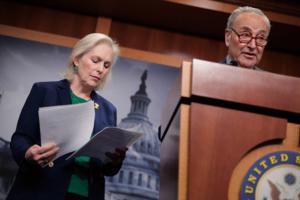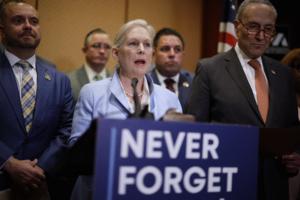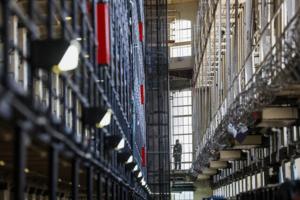Current News
/ArcaMax

With Illinois' grocery tax set to end, many municipalities are adopting their own, even as food prices climb
Voters in Bensenville, Illinois, recently made clear how they felt about a proposed 1% tax on groceries. In a referendum on April 1, 91% voted against it.
Even though the measure failed in Bensenville, at least 163 communities around the state have recently enacted local grocery taxes.
Gov. JB Pritzker signed a bill last year repealing the ...Read more

Romania far-right leader scores first-round election win
A far-right Romanian opposition leader who aligned himself with Donald Trump secured a first-round victory in a repeat presidential election, dealing a blow to the Black Sea nation’s ruling establishment amid outrage over persistent corruption and poverty.
George Simion of the ultranationalist Alliance for the Union of Romanians secured 40.2...Read more

More Georgia families are choosing to homeschool
Katrina Roman’s four Spanish students are slowly walking around their small classroom looking for something. These students, in grades K-12, don’t know what they’re searching for, but Roman prompts them by telling them if they are getting warm (“calor”) or cold (“frio”).
“Mucho frio (very cold), hace mucho frio (you’re very ...Read more

N.Y. Sen. Schumer slams Trump, RFK Jr. for 'just lying' about layoffs threatening 9/11 health program
The Trump administration’s funding shell game over the health program that treats 9/11 first responders with Ground Zero-related illnesses continued this weekend with a fresh round of layoffs — and New York’s Senate delegation is calling on their Republican colleagues to step up and save the program.
Friday’s mass layoffs at the ...Read more

Romania far-right leader wins first- round vote, poll shows
Romania’s far-right opposition leader won the first round of a presidential election repeat as voters took aim at the ruling establishment over persistent corruption and poverty in the Black Sea nation, exit polls showed.
George Simion of the ultranationalist Alliance of the Union of Romanians secured 30%, according to exit polls released by...Read more

Minn. woman's fight to renew her 92-year-old mother's Medicaid highlights the growing problem of short-staffed counties
Twenty-two voicemails.
That’s how many Vickie Schaefer left during a five-day stretch, trying to get someone at Hennepin County, Minnesota, to help her renew the financial assistance her 92-year-old mother relies on to pay rent at her assisted living facility.
Eventually, the Plymouth woman reached someone — on call 23 — but she worries ...Read more
5.4-magnitude quake, aftershocks rattle West Texas, seismologists say
A 5.4-magnitude earthquake shook the West Texas area just south of the New Mexico border, the U.S. Geological Survey reported.
The nearly 5-mile-deep quake hit west of Pecos, about 35 miles south of Whites City, New Mexico, at 7:47 p.m. on Saturday, May 3, according to the USGS.
More than 1,600 people from as far away as Hemet, California, and...Read more

With the state's grocery tax set to end, many municipalities are adopting their own, even as food prices climb
Voters in Bensenville, Illinois, recently made clear how they felt about a proposed 1% tax on groceries. In a referendum on April 1, 91% voted against it.
Even though the measure failed in Bensenville, at least 163 communities around the state have recently enacted local grocery taxes.
Gov. JB Pritzker signed a bill last year repealing the ...Read more

Trump signals willingness to lower China tariffs 'at some point'
President Donald Trump said he is willing to lower tariffs on China at some point because the levies now are so high that the world’s two largest economies have essentially stopped doing business with each other.
Trump has placed tariffs as high as 145% on Chinese imports. China has retaliated with tariffs of 125% on American imports. The ...Read more

NY Sens. Schumer, Gillibrand call for GOP lawmakers to step up after Trump layoffs threaten 9/11 health program
The Trump Administration’s funding shell game over the health program that treats 9/11 first responders with Ground Zero-related illnesses continued this weekend with a fresh round of layoffs — and New York’s Senate delegation is calling on their Republican colleagues to step up and save the program.
Friday’s mass layoffs at the ...Read more

1 person killed, at least 13 wounded in shooting at Houston party
One person was killed and at least 13 more wounded in a mass shooting at a family barbecue in Houston early Sunday morning, police said.
None of the victims has been publicly identified, and officials said Sunday they did not know the ages of all the victims.
Cops detained multiple people at the scene on Houston’s southeast side, but ...Read more

Survey: Georgia OB-GYNs say state abortion law risks mothers' health
A survey of 38 of Georgia’s OB-GYNs found that nearly half of doctors participating said they have personally encountered cases where care had to be delayed, causing death or health complications for the mother, as a result of ambiguity in the state’s abortion law.
The survey, done by the American College of Obstetrics and Gynecology in ...Read more

Czechs lead talks on ammunition supplies for Ukraine into 2026
Czechs are leading talks on continuing deliveries of heavy ammunition for Ukraine stretching into 2026, said President Petr Pavel.
The Czech leader, speaking after meeting Ukrainian President Volodymyr Zelenskyy in Prague on Sunday, said the so-called Czech ammunition initiative financed by 11 countries was on track to deliver 1.8 million ...Read more

Israel prepares to scale up pressure on Gaza ahead of Trump visit
Israel’s security cabinet was set to meet on Sunday to approve an expansion of military action in Gaza and discuss aid deliveries ahead of a planned visit to the Middle East this month by President Donald Trump.
The new ground operations will likely involve taking control of additional territory while stopping short of a full siege, ...Read more

Trump rules out firing Powell while pushing him to cut rates
President Donald Trump insisted he doesn’t plan to fire Federal Reserve Chair Jerome Powell despite his sustained criticism over the pace of interest rate cuts.
“Why would I do that?” he said in an interview on NBC’s "Meet the Press" with Kristen Welker that aired Sunday. “I get to replace the person in another short period of time.�...Read more

Dog data may help track dangerous disease for humans
SAN JOSE, Calif. — For man’s best friend, pet owners often go to great lengths – whether that’s doggy day care and specialty pup chow, or late nights at the vet running tests that drain bank accounts.
Now, a new study by researchers from UC Davis and UC Berkeley has found a way our canine companions can help us, offering a unique ...Read more

Women from Bay Area are leading the nation in delaying motherhood
LOS ANGELES — When it comes to delaying motherhood to pursue careers and other life aspirations, Bay Area women are leading the nation.
This region is home to the greatest share of women having children at 40 and older — a trend that experts chalk up to a combination of economic opportunity, progressive social norms and access to ...Read more

Thousands of California prisoners falsely tested positive for opioids. Did it cost them their freedom?
Thousands of inmates wrongly tested positive for opiate use inside California state prisons last year because of a laboratory mistake, and civil rights attorneys now worry many of them could be denied parole and a chance at freedom because of it.
About 6,000 drug tests are believed to have generated false positive results in 2024, according to ...Read more

Preventing homelessness: the tough job of predicting who is at real risk
LOS ANGELES -- When the unknown number popped up on her phone, Jocelyn Escanuela was in the checkout line at Walmart. She still can't explain why she picked up and then listened to a cold-caller's pitch that sounded a lot like a scam.
She had been selected to receive a grant of $6,000, the caller told her. And she would have a personal ...Read more

Elon Musk wins vote to establish his own city in Starbase, Texas
Voters in South Texas delivered Elon Musk a decisive victory, overwhelmingly approving a ballot measure to establish Starbase, Texas, as its own city.
By a margin of 173 to 4, residents of the far-flung community surrounding SpaceX’s rocket-launch site and headquarters voted resoundingly in favor of the incorporation effort, according to ...Read more
Popular Stories
- Trump sparks backlash dressed as pope in AI image shared by White House
- After disasters, FEMA leases apartments for survivors. But not after the LA fires
- 'Just bodies of animals everywhere': Toxic algae bloom taking a toll on Southern California's marine life
- Two men in ICE custody died of 'natural' causes. Were their deaths preventable?
- Elon Musk wins vote to establish his own city in Starbase, Texas





